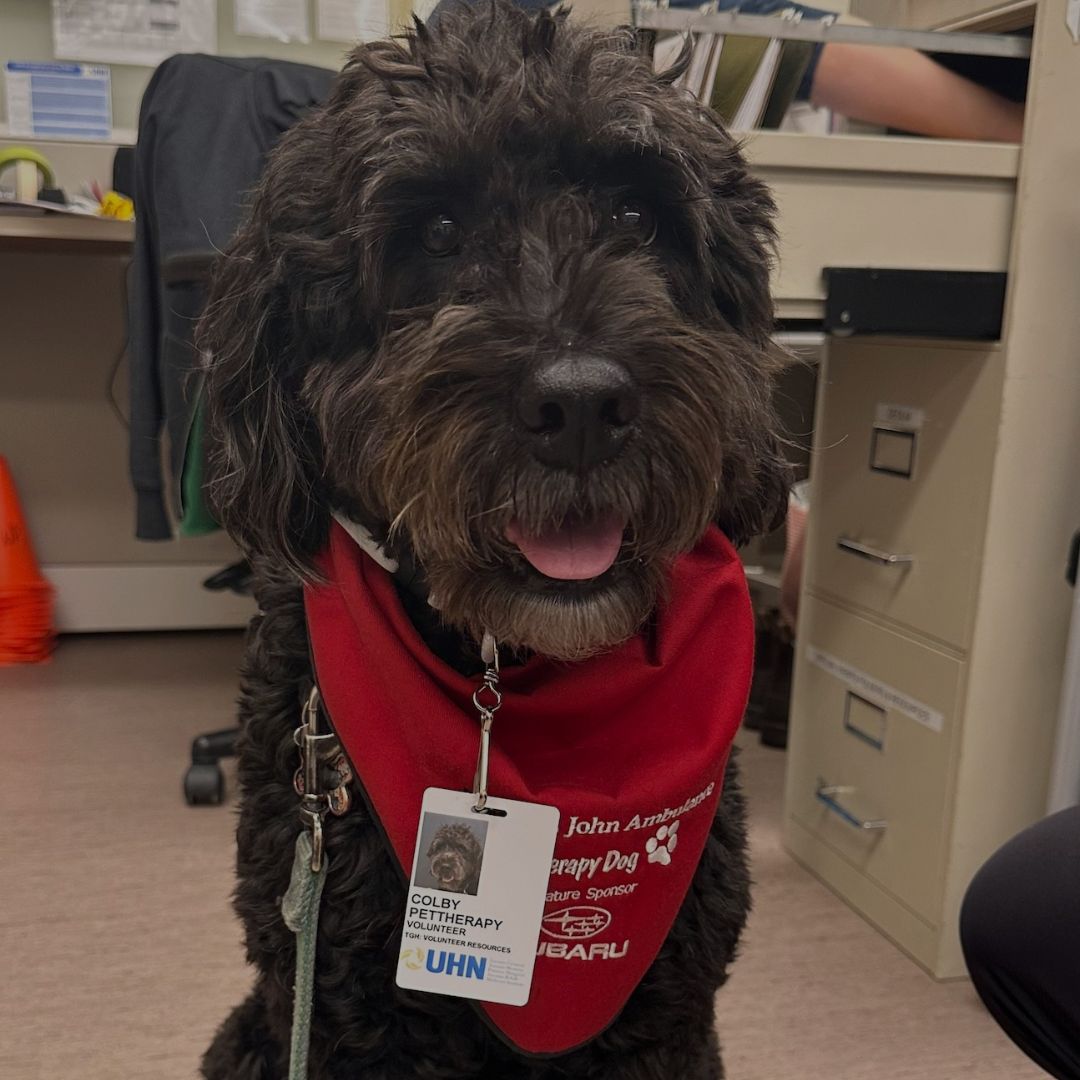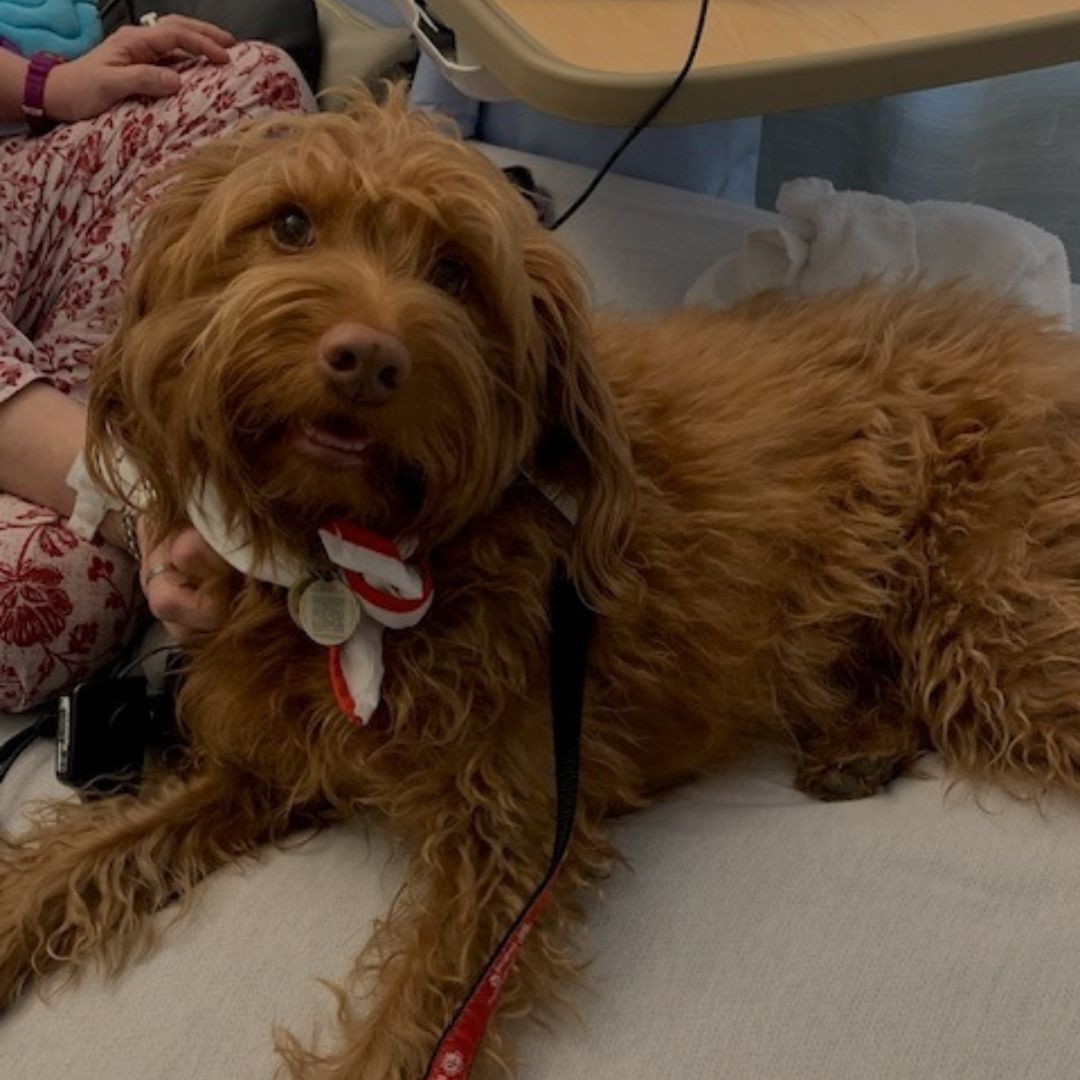
Family and friendships are vital – and for patients across University Health Network (UHN), several four-legged family members are very special friends to patients who need them the most.
Comprised of both specially trained dogs and their handlers, pet therapy teams are UHNITED in bringing smiles, comfort and companionship to inpatients at Toronto General Hospital, Toronto Western Hospital and Toronto Rehab. Teams come through St. John Ambulance and Therapeutic Paws of Canada, non-profit organizations of volunteers providing animal resources through regular visits to locations including hospitals, residences and schools.
At UHN, pet therapy dogs foster emotional bonds, providing relief and distraction for those awaiting treatments. Companionship is provided at whatever level patients are comfortable with – from petting and cuddling, to heartfelt conversation, to carrying out daily activities together.
Depending on the hospital and unit, team visits vary in terms of length of stays and how they are organized.
“Within a one-hour shift at Toronto Western, the dogs can see as many as 10 to 12 patients, it sometimes depends on the conversations they are having with the dogs,” explains Willy Phan, Program Coordinator with Volunteer Resources, who assists in running the Pet Therapy Program at Toronto Western.
After a two-and-a-half year break away from the hospital due to the pandemic, Willy saw firsthand the impact that Ruby, an 11-year-old labradoodle, had on patients after her return to Toronto Western in November. “Everyone gets excited when they see her – not just patients, but staff too,” says Willy. “They just light up – it lifts everyone’s mood.”
The reactions are similarly enthusiastic across other sites at UHN, where the Pet Therapy Program has allowed patients greater social interaction and participation in more activities, in addition to providing stress relief and distraction from pain and discomfort. It has even shown to improve their self-esteem.
“Patients love to learn about the dog and ask questions,” says Misty Tudor, Program Coordinator with Volunteer Resources, who coordinates the Pet Therapy Program at Toronto Rehab. “It is just really important to their overall mood, engaging them with things they would experience outside of the hospital, and getting them talking and connecting with other patients about the pets they might have at home.”
At Toronto General Hospital, Spiritual Care Practitioner Vicki Burns sees pet therapy dog Koko, a Shih Tzu, as a beloved companion for staff as well as patients. “As one patient said, it’s like having a pet, and someone to listen to you. The dog does not have any agenda – they’re just there to adore you.”

Companions back home
At home, relationships with dogs, cats, or other pets have profound health benefits, whether one is recuperating from a recent hospital stay or has never been admitted to a hospital before.
“Having pets at home is associated with many physical and mental health benefits, including having a routine and decreased loneliness. This may be of particular benefit to people recovering from significant illnesses and older adults,” says Dr. Kathleen Sheehan, Psychiatrist at the Centre for Mental Health, UHN.
Such pastimes as regularly walking your dogs, or playing, stroking, and bonding with cats, eases depression, combats loneliness and alleviates anxiety. Alongside bettering one’s mental health, this also leads to a lower predisposition to cardiovascular disease. Specifically, interacting with animals has been shown to decrease levels of cortisol (a stress-related hormone), thereby lowering blood pressure.
“There is research which supports what many pet owners already feel,” says Dr. Sheehan. “That pets are often considered part of our families, can be a significant source of support, and can provide us with a sense of purpose and well-being.”


No one ever changed the world on their own but when the bright minds at UHN work together with donors we can redefine the world of health care together.
